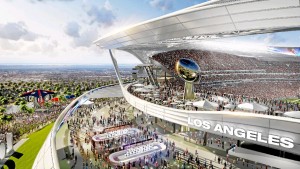
A subtle but significant shift is occurring in the quest to bring the National Football League back to Los Angeles. And it could mean the end is in sight.
As we know, three teams have officially attached themselves to two Los Angeles area stadium projects – both of which have been approved by local leaders and both now await league approval to begin construction.
St. Louis Rams owner Stan Kroenke is proposing a privately financed stadium in Inglewood while the Oakland Raiders and San Diego Chargers have teamed up to build a privately financed stadium in Carson.
The NFL has said it will approve just one Los Angeles stadium project and a maximum of two teams. The league hopes to decide by the end of the year what stadium and which team or teams will mark the re-entry into Los Angeles after a 20-year absence.
The consensus is someone will be playing in L.A. by the 2016 season, and with the leagues 32 owners set to meet in early October in New York to talk about Los Angeles, don’t be surprised if some obvious movement occurs in which a clearer end-game picture comes into focus.
Which brings us back to the shift that’s underway.
The NFL office has essentially been in charge of the painstaking process back to Los Angeles, with league Vice President Eric Grubman the point man in that quest. Since taking over the position, Grubman’s objective was to come up with a plan to crack the L.A. market – which he achieved with the help of the Rams, Chargers and Raiders – and it was mostly left to NFL office and staff to make the moves to get the process to this point.
But very quietly, albeit noticeably, the league office is beginning to transition the process into decision-making mode, and the result is the influence of the NFL office now yields to the influence of owners.
After talking to various league and team executives, the shift was inevitable. Ultimately, the league’s 32 owners will decide between the two stadium sites and the three teams. Any team wishing to relocate – or in this case get approval for their L.A. stadium – needs 24 votes of approval.
The ball, then, is beginning its slow roll into the owners court.
Still, the timing of it has caught some people by surprise. The league rarely does anything without a specific purpose behind it. So a few eyebrows are being raised, to be sure.
And it brings up some interesting questions.
For months now, it was assumed the league would drive this process to an outcome in which all three teams came away satisfied. In other words, the league would take into consideration the recommendations and input of the NFL’s six-owner Los Angeles committee and the full ownership group, but ultimately the wishes of the league office would carry the day.
And while it still might, it’s obvious the league is now putting the matter squarely into the hands of the 32 team owners. And while the league office might have an outcome preference, it clearly doesn’t believe its role is to dictate a decision.
In other words, it’s the belief of the NFL office that the owners themselves have to make the judgments they think are best for the league.
And if that’s how it plays out, it will be fascinating to see how much power the leagues Los Angeles owners committee carries.
After doing some poking around, the feeling is the committee might be leaning in favor of the Chargers and Raiders Carson project. And while that is significant, it’s more important how that support is interpreted by other owners, many of whom rely on the committee and league staff members for information and updates.
Do the other owners view the committee as a singular voice or simply a group of individual owners carrying six of 32 possible votes?
That’s a key distinction to make, as it might dictate the direction other owners take.
After all, there are so many various layers involved and so many factors to consider.
What if St. Louis comes through with financing to help build the Rams a new stadium?
Or what if St. Louis and Missouri leaders stumble before reaching the finish line?
How does the Raiders and Chargers inability to get traction on local stadium projects after years and years of trying play in to a decision?
It’s certainly not as simple as just picking Inglewood over Carson
Let’s also not forget that somehow, someway this might still fall into the hands of the league office. If the vote ends up in a stalemate, you have to figure NFL Commissioner Roger Goodell will be the ultimate tiebreaker. If so, Goodell could step in and convince enough owners to flip sides to give either Inglewood or Carson the necessary support.
The question being, is Roger Goodell an Inglewood guy or a Carson guy?
But then, maybe it never comes to that point.
Stay tuned.

